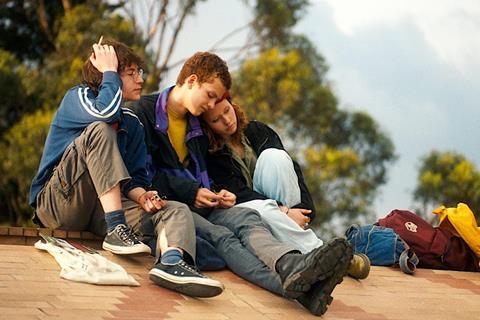Colombian drama is a quietly rich exploration of one family’s grief following the death of a teenage boy

Dir/scr: Juan Sebastian Quebrada. Colombia/France/Argentina. 2023. 89mins
A forceful, low-key study of the reaction of a middle-class Colombian family to the tragic death of a teenager, The Other Son is a quiet triumph. Successfully walking the tricky tonal tightrope of tackling the emotional fallout of such a tragedy without rubbing the viewer’s face in misery, Juan Sebastian Quebrada’s emotionally and psychologically rich debut combines in its best moments the intimacy of documentary and revelatory observation of people under emotional duress.
An emotionally and psychologically rich debut
An award in Rome for best independent film suggests solid future prospects for both The Other Son and its director, who has apparently based the storyline on events in his own life. Indeed, every scene feels charged with a sense of duty to precisely pin down the truth about what experiencing such a nightmare is really like.
Outgoing, good-looking Simon (Simon Trujillo) and shy, introverted Fede (Miguel Gonzalez) are the sons of Alberto (John Hurtado) and Clara (Jenny Nava), who are separated: Simon lives with Alberto, Federico with Clara and her partner Miguel (Gabriel Taboada). Early scenes efficiently set up the various underlying family tensions, including the troubled ongoing romance between Simon and Laura (Ilona Almansa). Shockingly, Simon falls to his death from a balcony during an alcohol and drug-fuelled house party.
Two early scenes are particularly devastating, refusing to spare viewer sensibilities: we see Simon’s body following his fall, and the hospital scene following that, with Clara screaming inconsolably. Both bring home the full force of the appalling event. But then the film becomes a quiet, almost forensic study of its consequences, unpicking with craft and care its differing repercussions on the lives of those who knew him.
Clara, compellingly played by Nava, descends into a kind of monomaniacal madness, obsessively watching old home movies of Simon as a child, becoming aggressive and foul-mouthed, and talking to his ghost. Alberto focuses on trying to work out what actually happened at the party, urgently seeking someone to blame: the big question mark is over whether Simon’s fall was an accident.
The viewer experience comes mainly through the eyes of Fede, the ‘other son’ of the title, who is closely wrapped up in the horror but also, in the interests of his own psychological survival, slightly detached from it. Gonzalez wears an appropriately searching, heavy-lidded gaze and does terrific, nuanced work as a sensitive teen who is simply overwhelmed by the enormity of it all, wearing Simon’s jacket for reasons he cannot quite understand, and trying to focus on keeping his own life going – the plan is for him to go to Paris to study music.
On the one hand, Fede looks on appalled as he sees the adults in his life falling apart under the weight of their own guilt; on the other he struggles to negotiate his way through it with the support of his peers, who inevitably seem to understand what he’s going through a lot better than the grown-ups. Already living in the shadow of the confident, extroverted Simon while his brother was alive, his death seems to have pushed Fede even further towards the margins of the family.
The film’s most engrossing strand is in the developing relationship between Fede and Laura; in the absence of answers from anyone else, they inevitably gravitate toward each other, especially following Fede’s discovery of text messages between Laura and Simon recovered from the smashed phone in Simon’s pocket. Fascinatingly, their relationship starts to fill the absence left by Simon: there is even the dark but intriguing suggestion that Fede can now use the relationship to emerge from under his brother’s shadow.
All of these subtle, complex emotional underpinnings are recorded by Quebrada in a contained, intimate manner, via murmured conversations, exchanged glances and telling details, shot in interiors comprising living rooms, bedrooms and night-clubs – the one place where the kids can truly be themselves. Barring a final scene that wraps things up on an upbeat note that feels a little forced, the melodrama that threatens to break through happily remains tightly under wraps. “When someone dies,” Clara tells Fede, “nothing makes sense any more”: the success of The Other Son is in the way it cathartically manages to build hope from the emotional wreckage of such senselessness.
Production companies: Evidencia Films, Geko Films, Le Tiro Cine, Vaya Films
International sales: Film Factory Entertainment info@filmfactory.es
Producers: Franco Lolli, Capucine Mahe, Gregoire Debailly, Nicolas Grosso, Alvaro Vasquez, Cesar Rodriguez
Cinematography: Michael Capron
Production design: Angels Garcia Frinchaboy
Editing: Julie Duclaux, Pascale Hannoyer
Music: Carlos Quebrada
Main cast: Miguel Gonzalez, Ilona Almansa, Jenny Nava, Gabriel Taboada, John Hurtado, Simon TrujilloCol
























